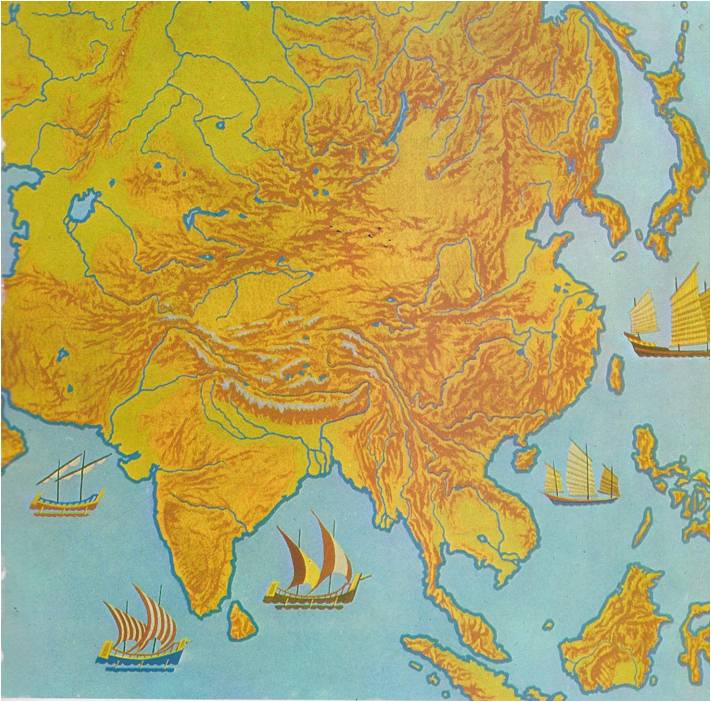Two hundred years before Columbus discovered America, a certain Marco Polo told strange, exciting stories to his friends and neighbours in Venice, a city in northern Italy. He had travelled, he said, to distant lands in Asia and had become rich. Europeans at that time had some general knowledge of eastern Asia and of its products, but Polo furnished detailed and colourful descriptions of magnificent cities, of strange customs and of powerful rulers who owned many palaces and lived in unheard of luxury. Marco Polo had visited the court of the khan, or ruler, of an empire that included most …
Read More »Tag Archives: Indian Ocean
India and the Indies 1856 – 1914
In 1856, Great Britain was at war with Russia in the Black Sea area and with the Chinese emperor in south China. Many British troops had been withdrawn from India to fight on these battlefronts. As a result, nine-tenths of the 200,000-man army guarding Great Britain’s largest and richest possession, the subcontinent of India in south-central Asia, consisted of native soldiers called sepoys. At the time, the British were putting a new type of rifle into service in the Indian Army. To load it, a rifleman had to insert each cartridge separately and the cartridges were covered with grease. In …
Read More »Stepping-Stones for the West, 1869
ON NOVEMBER 16, 1869, the sun rose over the eastern end of the Mediterranean Sea and shone on the blue water. The squat buildings of Port Said, on the shore of Egypt, glowed against the clear sky. A new town, Port Said had begun to rise only ten years before from the barren plain that joins Africa to Asia. In the man-made harbour were crowded eighty ships. Some were warships, others merchantmen, but all were strung with brightly-coloured pennants. On board were distinguished visitors, among them the emperor of Austria-Hungary, the crown prince of Prussia, the prince of Holland and …
Read More »Prince Henry’s School 1415 – 1499
IN 1415, WHEN ALL OF CHRISTENDOM belonged to one church and Christians battled pagan Turks instead of one another, a force of Portuguese marines set sail for the coast of Africa. They planned to attack a town called Ceuta. A stronghold that guarded the narrow passage connecting the Mediterranean Sea with the Atlantic, Ceuta was the end link in the chain of fortresses and well-armed ports that the Turks had tightened around the southern and eastern boundaries of Europe. Held in by this chain, European merchants could not trade in the luxury-filled markets of the east, pilgrims could not journey …
Read More »The Coming of the Europeans A.D. 1498-1707
MORE than two centuries before Aurungzeb’s death and even before the coming of Babur, a new kind of invader had appeared in India. Instead of thundering down on horseback from the Himalayan passes, he arrived on the coast by ship. Instead of plunder, he sought trade. Instead of wanting to conquer the subcontinent, he wanted to conquer the seas around it. This invader’s name was Vasco da Gama. He had sailed his small fleet all the way around Africa from his homeland of Portugal in southwest Europe. In 1498, just six years after Columbus discovered America, he landed at the …
Read More »India: A Thousand Years of History A. D. 1 – 710
UNTIL 1947, when the Moslem state of Pakistan was carved out of its western and eastern corners, the entire triangle of land that points south from the Himalaya Mountains into the Indian Ocean was known as India. Geographers call this huge land mass a subcontinent, because it is almost completely cut off from the rest of the continent of Asia. The Himalayas on its northern frontier form a continuous barrier of rock, the highest in the world. “MOTHER GANGES” From the southern slopes of the Himalayas, two great rivers run down to the ocean. The valley of the Indus River, …
Read More »The Conquerors 343 B. C. – 323 B. C.
In 343 B. C., the philosopher Aristotle left the quiet of his study and journeyed to Macedonia, a country in the mountain wilderness north of Greece. He had been hired to tutor the rowdy young son of a king. The boy, Alexander, was a yellow-haired thirteen-year-old. His manners were polite and he seemed to be clever enough, but he was wild. It was hard for him to pay attention to his studies. He much preferred galloping across the fields on his huge horse. He proudly told his new tutor that he had tamed the horse himself. When he did come …
Read More »





